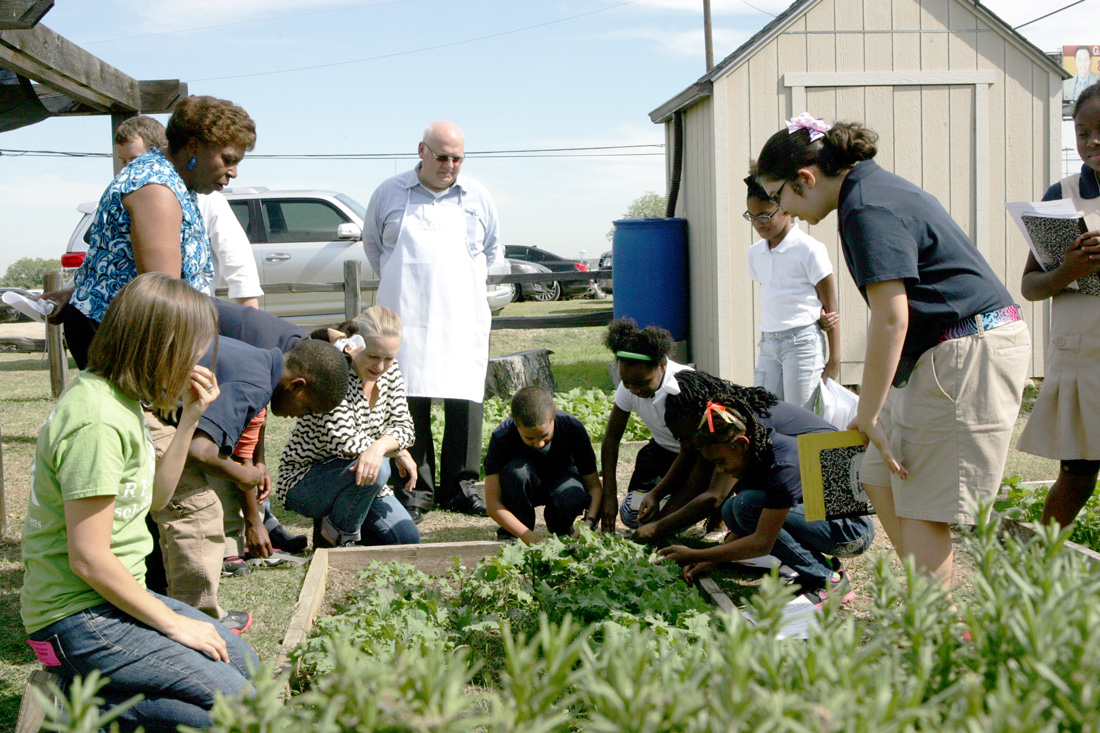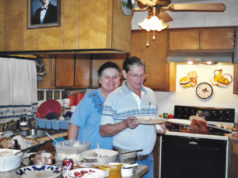Say the words “school garden,” and the image conjured up is likely that of untended greens growing behind a chain link fence in a dilapidated corner of a schoolyard. But for kids whose schools participate in REAL School Gardens, the reality is completely different. Students, teachers, and parents actively tend the beds, creating “flourishing, beautiful work,” said Andrea Harper, principal of T.A. Sims Elementary School. Since 2007 the Fort Worth nonprofit has put gardens into 98 schools in low-income communities in Tarrant and Dallas counties.
For the past four years, REAL School Gardens has partnered with Grace Restaurant in a unique garden-to-table enterprise. The kids grow produce, and the restaurant’s chef, Blaine Staniford, uses the herbs and greens to prepare a meal. This year, the gardens at four Fort Worth elementary schools — D. McRae, Meadowbrook, I.M. Terrell, and Sims — have been harvested. Staniford, along with Grace’s co-owners, Adam and Carolin Jones, visited the schools last week. The students showed off the results of their labor. The restaurateur and chef gave the kids a lesson in culinary arts, and everyone had a snack (but not from the gardens). The produce will be used for a fund-raising dinner next week benefitting the program. A group of the student gardeners will go to Grace for their own dinner and a meet-and-greet with donors that evening.
REAL School Gardens partners with schools for three years to get the gardens growing. But the effort is not just about the food. The nonprofit’s emphasis is less on feeding the students and more on helping teachers improve their schools’ bottom lines: standardized test scores. Educators from the organization work with teachers to help improve student performance through a curriculum that applies classroom lessons about math, science, and English to the real world of the garden. The result: Schools partnering with the organization see an improvement in scores in those areas. T.A. Sims principal Harper said the garden has “absolutely increased our science test scores” since it was first planted three years ago.
The four Fort Worth schools were chosen for several reasons, said REAL School Gardens’ regional director Scott Feille. The majority of the schools are in “food deserts” — the technical term for areas where access to fresh produce and whole ingredients is scarce and fast food joints outnumber supermarkets.
“The schoolyard harvest is an opportunity for students to learn about growing and preparing healthy food,” Feille said. “In addition, it introduces them to careers in culinary arts.”
For the Nov. 7 dinner at Grace, the students grew a variety of herbs, lettuces, radishes, and two kinds of kale. Grace co-owner Adam Jones, whose mother was a schoolteacher in his home state of Nebraska, said the partnership with his chef and his restaurant wasn’t a difficult sell. “It’s a great event every year,” he said. “The kids learn about how food actually gets to the table.”
Jones said that Grace is frequently asked to host or contribute to benefits for children. Many of those events are for disease prevention or treatment organizations helping sick children. The REAL School Gardens dinner helps kids learn what it takes to grow food and encourages them to pursue healthy lifestyles that may reduce the risk of some medical conditions, including obesity and type 2 diabetes.
REAL School Gardens is no fly-by-night organization. Feille said 97 percent of the learning gardens built over the past six years are still active, thanks to continued backing from REAL financial supporters for a site-based coordinator, seasonal training for teachers, and free plants and seeds for the schools. Some schools participate in programs that contribute potatoes to the Travis Avenue Baptist Church’s food pantry.
Feille said that one of the keys to the organization’s success is its training and lesson plans. “All of our lesson plans are tied to state science, math, and language arts standards,” he said, standards that form the basis for the STAAR and other standardized tests. “We’ve got lessons for every grade, and we make sure they’re easy for teachers to implement.”
[box_info]
REAL School Gardens Dinner
6:30-8:30pm Thu, Nov 7, at Grace, 777 Main St, FW. For reservations, visit realschoolgardens.org/schoolyardharvest.
[/box_info]











